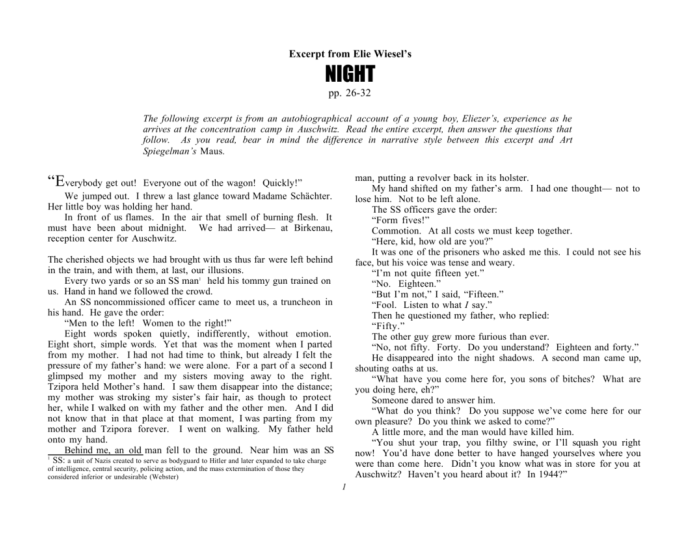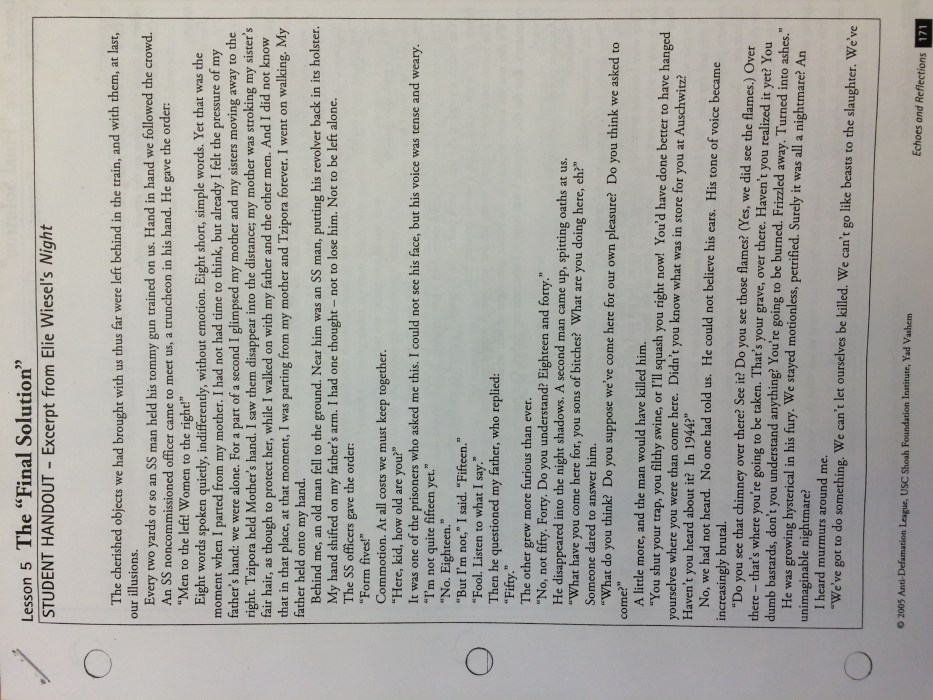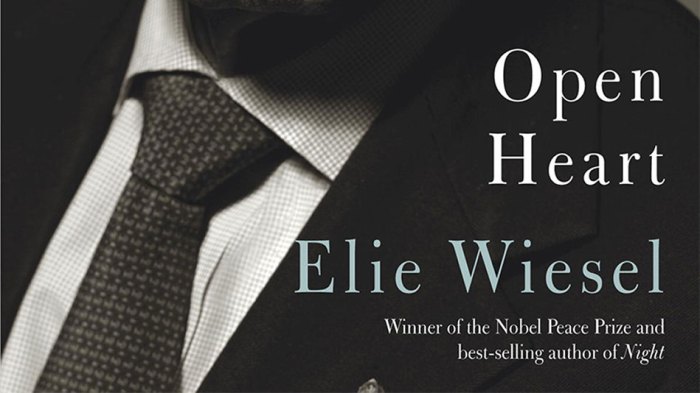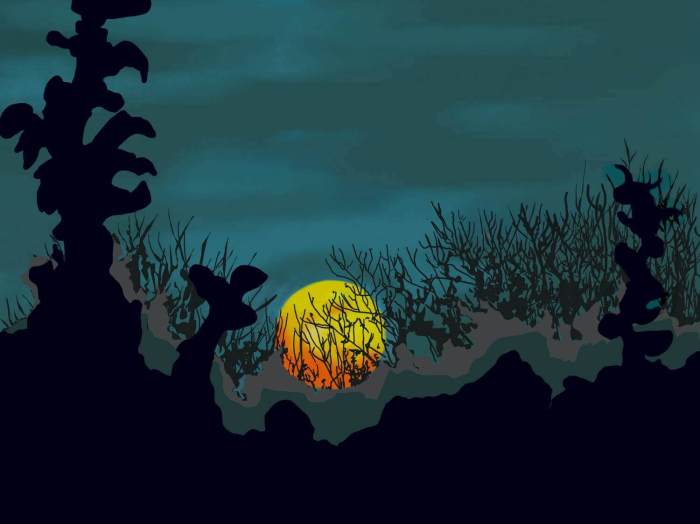Night by Elie Wiesel Excerpt embarks on a poignant journey, exploring the profound themes of innocence lost, the dehumanizing effects of extreme circumstances, and the relentless struggle for faith amidst adversity.
This excerpt offers a haunting glimpse into the horrors of the Holocaust and its profound impact on the human spirit.
Overview of the Excerpt

The excerpt is taken from the novel “Night” by Elie Wiesel, a harrowing account of the author’s experiences as a Jewish prisoner in Nazi concentration camps during the Holocaust.
The excerpt depicts a moment of profound despair and hopelessness as Elie and his fellow prisoners are forced to witness the hanging of a young boy. The boy’s innocent suffering and the indifference of the guards who carry out the execution serve as a stark reminder of the dehumanizing horrors of the Holocaust.
Themes Explored in the Excerpt: Night By Elie Wiesel Excerpt
Elie Wiesel’s Nightexplores several profound themes that are central to the human experience. In this excerpt, two key themes emerge: the loss of innocence and childhood, and the dehumanization of individuals in extreme circumstances.
The Loss of Innocence and Childhood
The horrors of the Holocaust irrevocably robbed Eliezer of his childhood. Once a carefree boy filled with dreams and aspirations, he is transformed into a hardened survivor, forced to witness unspeakable atrocities and confront the harsh realities of life in a concentration camp.
- Eliezer’s description of the children singing “Tomorrow, tomorrow” as they march towards the gas chambers captures the cruel irony of their situation.
- The image of the child hanging from the gallows serves as a haunting reminder of the innocence that was lost.
The Dehumanization of Individuals in Extreme Circumstances
In the concentration camps, individuals are reduced to mere numbers, stripped of their humanity and treated like cattle. Eliezer’s experiences illustrate the profound psychological and physical toll that such dehumanization can take.
- Eliezer’s father, once a respected man, is reduced to a pitiful creature, begging for scraps of food.
- The guards treat the prisoners with utter contempt, using violence and intimidation to control them.
Symbolism and Imagery in the Excerpt

Elie Wiesel’s “Night” is a powerful and evocative memoir that employs symbolism and imagery to convey the horrors of the Holocaust and the depths of human suffering. In the excerpt, several key symbols and images emerge, each carrying profound meaning and contributing to the overall impact of the narrative.
The Night as a Metaphor for Darkness and Despair
Throughout the excerpt, the night serves as a potent metaphor for the darkness and despair that envelops the prisoners. The darkness represents the physical and emotional isolation they experience, as well as the moral void created by the Nazis’ atrocities.
The night also symbolizes the unknown and uncertain future that lies ahead, instilling a sense of dread and hopelessness.
The Train as a Symbol of Dehumanization and Transportation to an Unknown Destination
The train in the excerpt symbolizes the dehumanizing process the prisoners undergo. Packed into cattle cars like animals, they are stripped of their individuality and dignity. The train also represents the unknown destination they are being transported to, a place of unimaginable horror and suffering.
The journey on the train becomes a metaphor for the descent into the abyss of the Holocaust.
The harrowing experiences depicted in Elie Wiesel’s “Night” serve as a chilling reminder of the horrors of the Holocaust. To delve deeper into the subject, consider exploring nbme 12 answers step 2 , a comprehensive resource that provides insights into the medical implications of the Holocaust.
Returning to Wiesel’s masterpiece, “Night” remains an essential read, offering a poignant glimpse into the depths of human suffering and resilience.
The Bread as a Representation of Hope and Sustenance
In the midst of the darkness and despair, the bread that the prisoners receive becomes a symbol of hope and sustenance. It represents the small glimmers of humanity that remain even in the face of unimaginable evil. The bread provides physical nourishment, but it also serves as a reminder that there is still something worth fighting for, even in the most desperate of circumstances.
Literary Devices in the Excerpt

Elie Wiesel’s Night is a powerful and haunting memoir that explores the horrors of the Holocaust. The excerpt provided is rich in literary devices that enhance the narrative’s impact and convey the protagonist’s experiences.
Figurative Language, Night by elie wiesel excerpt
Wiesel employs vivid figurative language to create vivid and emotional imagery. For example, he uses metaphors such as “the night that devoured the world” to describe the overwhelming darkness and despair of the Holocaust. Similes, like “like a frightened bird,” capture the vulnerability and fear of the prisoners.
Irony and Foreshadowing
Wiesel uses irony and foreshadowing to create a sense of tension and foreboding. For instance, the narrator’s initial hope and belief in humanity are ironically contrasted with the horrors he witnesses. Foreshadowing hints at the coming atrocities, such as when the prisoners are forced to give up their possessions, a symbolic act that foreshadows their eventual loss of identity.
Stream of Consciousness
Wiesel employs stream of consciousness to convey the protagonist’s inner thoughts and emotions. This technique allows the reader to experience the narrator’s confusion, fear, and despair firsthand. The fragmented and disjointed thoughts reflect the chaotic and overwhelming nature of the Holocaust.
Structure and Organization of the Excerpt

The excerpt from “Night” by Elie Wiesel is structured around a series of flashbacks and foreshadowing, as the narrator reflects on his experiences during the Holocaust. The transitions between scenes are smooth and fluid, often using sensory details to connect different moments in time.
The use of dialogue and internal monologue adds depth to the characters and allows the reader to understand their thoughts and emotions. The narrator’s internal monologue often reveals his innermost fears and struggles, while the dialogue between characters provides insight into their relationships and interactions.
Use of Flashbacks and Foreshadowing
The excerpt is primarily structured around a series of flashbacks, as the narrator recalls his experiences in the concentration camps. These flashbacks are often triggered by sensory details, such as the smell of burning flesh or the sound of screaming.
The flashbacks provide a vivid and visceral account of the horrors of the Holocaust, and they serve to highlight the narrator’s ongoing trauma.
The excerpt also uses foreshadowing to create a sense of dread and anticipation. For example, the narrator’s description of the “selection” process foreshadows the eventual fate of many of the prisoners. The use of foreshadowing adds to the emotional impact of the excerpt, as the reader is constantly aware of the impending danger that the narrator and his fellow prisoners face.
Transition from One Scene to Another
The transitions between scenes in the excerpt are often smooth and fluid. The narrator often uses sensory details to connect different moments in time. For example, the transition from the narrator’s description of the “selection” process to his description of the prisoners being herded into cattle cars is marked by the use of the word “cattle.”
This sensory detail helps to create a sense of continuity and flow between the two scenes.
Use of Dialogue and Internal Monologue
The use of dialogue and internal monologue adds depth to the characters and allows the reader to understand their thoughts and emotions. The narrator’s internal monologue often reveals his innermost fears and struggles. For example, in the following passage, the narrator reflects on his feelings of guilt and shame:
“Why should I be here? Why am I alive? Why have I been spared? Why not my father, my mother, my sister? Why not all the others?”
The dialogue between characters provides insight into their relationships and interactions. For example, in the following passage, the narrator describes a conversation with his father:
“‘My son,’ he said, ‘I don’t know if I will ever see you again. But I want you to know that I love you. And I want you to always remember that you are a Jew. Never forget that.'”
The use of dialogue and internal monologue helps to create a sense of intimacy and connection between the reader and the characters. The reader is able to understand the characters’ thoughts and emotions, and to empathize with their experiences.
Characters and Character Development

The excerpt from “Night” by Elie Wiesel showcases a profound transformation in the protagonist, Eliezer, as he navigates the horrors of the Holocaust.
Eliezer’s Transformation
Initially portrayed as a devout believer, Eliezer’s faith is shattered by the atrocities he witnesses. His belief in a benevolent God is replaced by disillusionment and despair. This transformation is evident in his poignant statement, “I had ceased to pray.
I concluded that God did not exist.”
Eliezer’s Father
Eliezer’s father plays a pivotal role in his journey. Despite their strained relationship, his father’s presence provides a sense of stability and hope. Eliezer relies on his father for physical and emotional support, particularly during their harrowing experiences in the concentration camps.
Interactions with Others
Eliezer’s interactions with other characters highlight the brutality of the camp environment. The prisoners are dehumanized and reduced to mere numbers, while the guards wield absolute power over their lives. The interactions between Eliezer and the guards reveal the extent of human cruelty and the erosion of basic human rights.
Historical and Cultural Context

Elie Wiesel’s “Night” is a harrowing account of the Holocaust and its devastating impact on the Jewish people. The novel explores the themes of faith, memory, and the importance of remembrance in the face of unspeakable atrocities.
The Holocaust and its Impact on the Jewish People
The Holocaust was a systematic genocide perpetrated by the Nazis against the Jewish people during World War II. Six million Jews were murdered in concentration and death camps, including Wiesel’s own family. The Holocaust had a profound impact on Jewish identity and culture, leading to a deep sense of loss and trauma.
The Role of Religion and Faith in the Face of Persecution
In “Night,” Wiesel explores the complex relationship between religion and faith in the face of persecution. While many Jews lost their faith in God during the Holocaust, Wiesel argues that it is important to maintain hope and faith, even in the darkest of times.
The Importance of Memory and Remembrance
Wiesel believed that it was essential to remember the Holocaust and its victims. He dedicated his life to writing and speaking about his experiences in order to ensure that the world never forgets the horrors of the past. “Night” serves as a powerful reminder of the importance of memory and remembrance, and it continues to inspire people around the world to fight against hatred and intolerance.
Questions and Answers
What is the significance of the night in the excerpt?
The night represents the darkness and despair that envelops the characters during the Holocaust.
How does Eliezer’s faith change throughout the excerpt?
Eliezer’s faith is initially strong, but it is gradually eroded by the horrors he witnesses.
What is the role of symbolism in the excerpt?
Wiesel uses symbolism throughout the excerpt to convey the dehumanizing effects of the Holocaust. For example, the train represents the transportation of prisoners to death camps.